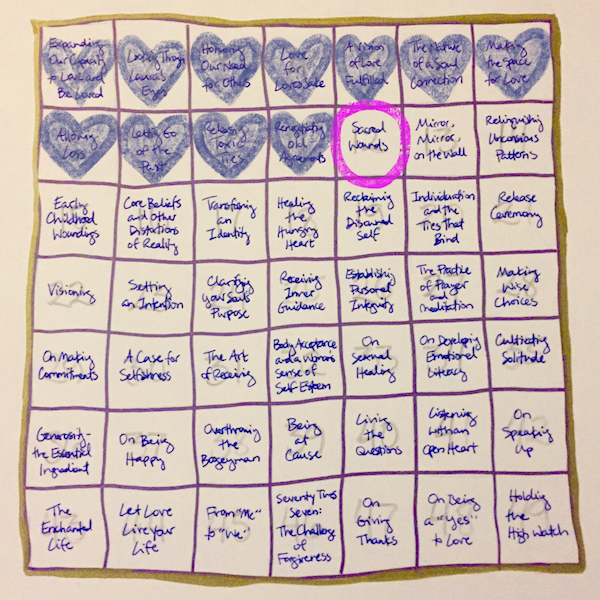You’re about to read Chapter 12. Want to start this story from the beginning? Go here.

I’m beginning to understand why I never made it past Lesson 18 of this quest.
This work is getting intense.
I am still feeling aftershocks from yesterday’s seismic shift of renegotiated agreements. And straight up on the heels of letting Paul go like never before, I am supposed to dive into the topic of sacred wounds?
What even is a sacred wound?
The phrase “sacred wound” makes me scrunch my nose, and if you could hear me, I might also be making a sound that approximates choking back vomit.
In fairness, I think I’ve been pretty easy on Katherine’s word choices so far. I haven’t complained about the abundance of flowery self-help phrases—I know what I signed up for.
But, “sacred wounds”? Really?
It just feels a bit melodramatic, is all I’m saying.
However, if I can get past my hang-up with the terminology, I can surely see the value of the concept.
Sacred wounds are for warriors
We’ve all suffered, and by surviving and healing, the very pains that hurt us become our blessings. These “sacred wounds” allow us to uniquely sally forth out of the darkness and brightly shine for the benefit of ourselves and others.
What doesn’t kill you makes you stronger, and whatnot.
Rather than see ourselves as victims and identify with our past pain, we’re encouraged to focus on the strength and courage that has helped us overcome.
“This is not a denial of what we’ve been through but, rather, an awareness that the essence of who we are is far, far beyond it.”—CITO p.77
I have no objections to this perspective.
In fact, I adopted it years ago, which is probably why I feel so icky about digging into this topic now.
I don’t WANT to revisit my wounds. I have worked hard, for years, to heal them. Yes, I know they make me who I am.
I am a survivor. I am a warrior. And I am someone who wants to move on.
Lesson 12, in practice
I am also someone who does her homework, however reluctantly.
And in cataloging the prescribed “woundology” biography, I noticed a hesitation that paralleled my experience with the #metoo movement that has recently swept the interwebs.
As I paused to consider each of the “hardships” in my life, I found myself wondering what was even worth writing down.
Was getting ridiculed and shunned for my chronic and severe skin condition from 1st–6th grade really such a big deal?
Plenty of kids had it way worse than me.
Was my parents’ sudden divorce my freshman year of college, followed by each of them recoupling within a year, even worth mentioning?
Divorce is, like, too basic to even count as trauma.
Is it really necessary to classify my relationships with Leo and Jim as “abusive”?
I have worked with battered women. I never was one.
Aaaaaaaand so on and so forth, until I remembered something important:
TRAUMA IS NOT RELATIVE.
Yes, #metoo, and probably also you
I have nothing to prove with my wounds.
What hurt me, hurt. And that’s it. End of explanation.
Also, to answer your questions, hesitant-version-of-Christina:
Yes, it was a big deal that you were ostracized and shamed throughout your childhood.
Yes, it’s worth mentioning that at the height of your adolescence, your family shattered, fragmented, and reformed, all before you had a chance to look at the pieces.
And yes, when a relationship involves verbal threats, physical intimidation, and/or sexual coercion, that relationship is considered abusive. Sorry.
So, just like I eventually told Facebook #metoo even though I’ve never been roofied or groped by a coworker, I finally wrote down my wounds.
Because sharing the truth of what happened is not the same as feeling sorry for myself.
And there is no threshold for “bad enough” that ever needs to be met.
All we have to decide is that we want to be better.
Self-love is my sacred wound
Katherine says that “wherever you’ve suffered the most is where you have the opportunity to contribute the greatest amount.”
So it makes sense that the second part of the Lesson 12 homework was to identify the “wounding that is now your greatest strength and your contribution to others. Write about your Sacred Wound.”
Partly for the sake of transparency, and partly because I don’t feel like trying to summarize, here is an excerpt of what I wrote:
What is my sacred wound? Surviving heartbreak by learning self-love. The deepest trust that all is well and full faith in spirit to nourish me in ways my family and exes did/could not. I love myself SO MUCH, because I am not me, I am god’s, and I can be of greater service because I have suffered….My sensitivity—how deep I felt the hurt—is also how deeply I can heal. My empathy is immense and yet boundaries are also present; a valuable combo indeed. My gifts are needed.
I’m sure I’m not the only one whose resume is stacked with heartbreak of different sorts.
But I do think my fierce commitment to self-love—first learning it, and now living it—enables me to better support others who might still be stuck in painful places I have surpassed.
Because, like I told my journal, I do have the deepest trust that all is well.
As a child of god, I can always receive love that no human needs to give.
And as a servant, warrior, witness, etc., I pledge to do all I can to “love in a way that heals the entire world.”
I’d just prefer to avoid the phrase “sacred wound,” okay?
Love > fear,
Christina
Want to know what happens next? Proceed to Chapter 13.
Missed what happened before? Go back to Chapter 11, or start from the beginning.
Comments are closed.